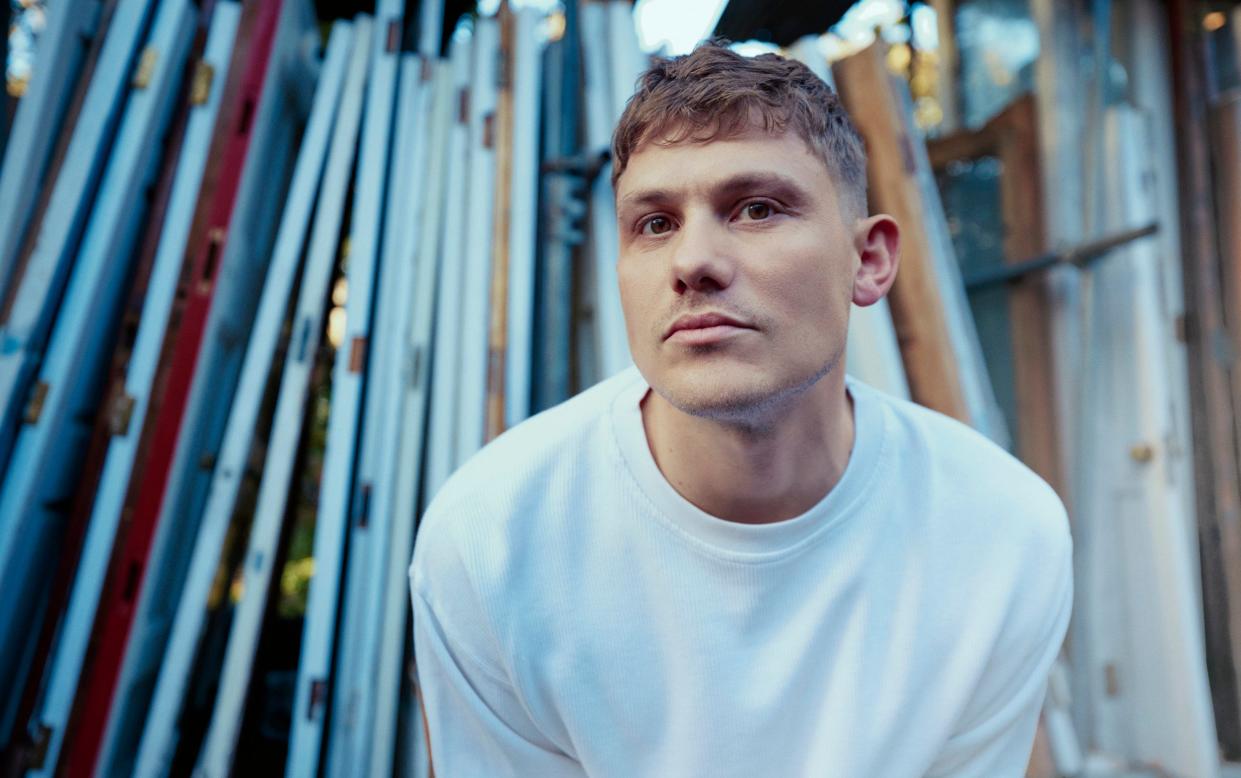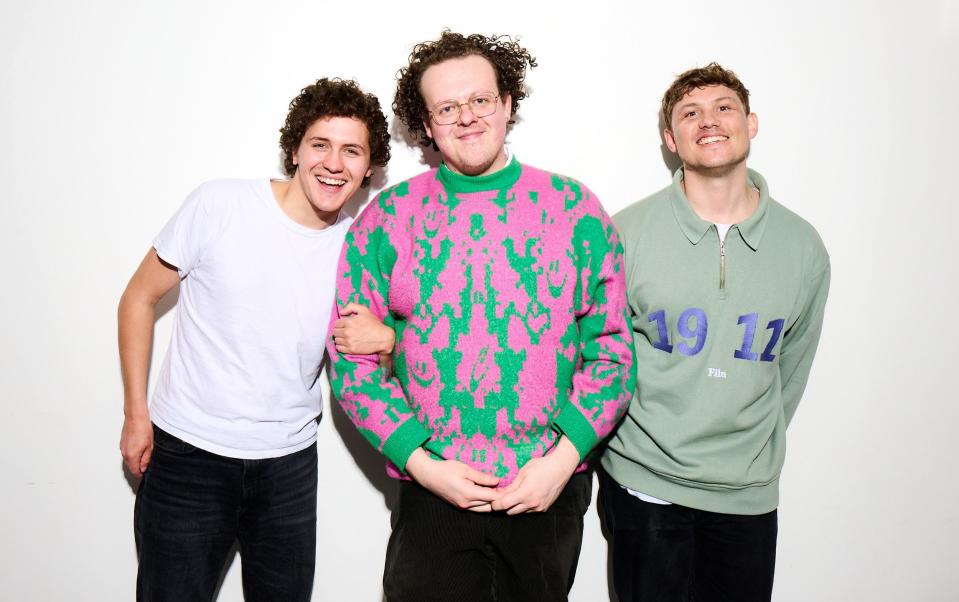Big Boys' Jon Pointing: 'Football, rugby, banter – you do what you can as a teenager to fit in'

“Most working-class people think there’s a huge gulf between their world and the idea of a career in the arts,” says Jon Pointing. “Luckily,” grins the mid-thirties actor, “my mum was a bit of an oddity on the estates where I grew up. She took us to galleries and smaller theatres like Battersea Arts Centre. So I always thought that acting was a realistic ambition. I probably pictured myself doing plays in parks or whatever, though,” he shrug-smiles, shyly. “So this,” he gestures around us at Channel 4’s glass-walled offices, “is all very nice.”
We’re here to discuss the second season of Jack Rooke’s terrific, tender hearted sitcom Big Boys, in which Pointing steals the show as Danny, the straight best friend of the nerdy gay hero, Jack (Derry Girls’ Dylan Llewellyn). The tale is the semi-autobiographical account of Rooke’s experience of coming out at university in the early 2000s, with the support of “lovely, laddish straight guys”. But Rooke tells me that he had an uphill battle selling the story.
“TV commissioning-types kept telling me ‘that’s not believable’,” he rolls his eyes. “They thought gay men didn’t have straight mates. They think if they haven’t seen something on TV before, then it doesn’t happen. But I kept telling them: ‘That is my actual experience!’ When I was coming out, I was anxious and I felt way more ‘seen’ and accepted by my straight friends. They were like: ‘Cool, we’ll go to the gay bar with you.’ I felt way more included by them than by some of the more cliquey, exclusive gay groups, which I found really intimidating.”
Rooke shakes his head. “Some maths that even TV commissioners can get their heads around: statistically, a gay person is more likely to have a straight best friend than the other way around.” In another flip of the mainstream narrative, while Big Boys’ Danny puts up a confident, macho façade – claiming to be at university in pursuit of booze and birds – he’s actually struggling with depression.

“Although Jack is coming to terms with both the death of his dad and his sexuality,” Rooke explains, “it’s Danny who’s more vulnerable. His story is based on my experience of meeting these guys who looked like a ‘fit, uncomplicated bloke studying journalism’ on the surface, but when I got to know them, they were completely drowning in mental-health problems.” When Rooke met Pointing in 2017, he saw his perfect Danny. “I knew he could do all the goofy, laddish stuff, but with real texture and integrity. I didn’t cast him so much as build the show around him.”
Classically handsome and gym-buffed, the son of a tradesman – “I spent quite a lot of time on building sites as a kid” – Pointing knows he comes across as a Jack the Lad. “That’s why I’m such a good fit for Danny.” Growing up in Carshalton, then Epsom, he says he learnt to armour his quite “thoughtful, bashful” core with a degree of cocky blokeishness. “It’s about survival,” he says. “I grew up in a very traditional, patriarchal culture. Football, rugby, banter. In your teens, you ask yourself: how can I have the easiest life? And you do stuff to fit in.”
Pointing’s ambitions in the arts were not helped by attending a “dreadful” high school. “I was invited back to speak recently,” he says. “And it seems to be a good school now. But I had to tell them that I couldn’t say anything nice about my time there. I didn’t have a drama teacher for the last six months of my A-level drama course. Nobody took it seriously.”
He got no guidance on higher education and ended up doing a drama degree at a university – rather like Big Boys’ fictional University of Brent – where his tutors were “rubbish”. He adds: “I left uni with no idea of how to get an agent, how to put on a show.”
Pointing credits his wife – the actress and comedian Sarah Moore – with inspiring him to take his goals more seriously. “We met when we were both working in a bar in Dalston,” he says. “She is in this brilliant theatre group called Figs in Wigs. They were going to do a show up in Edinburgh and I was offered the chance to share an hour of stand-up with another comedian, so I went too. It was a great time. I was falling in love, high on the energy of performing, I didn’t care that hardly anyone was watching…”
Cleverly, Pointing built some of his early stand-up around the idea of small or disengaged audiences. He created the character of “a guy who thought he was some maestro of theatre, a great thespian, giving a masterclass. The fact that he was giving this masterclass in the corner of some pub made him funnier. If anybody shouted ‘shut up!’ I’d get into it and invite hecklers to share their feelings with the class.” He chuckles. “But, actually, that character was grim. He was an amalgam of some of the teachers from uni and other people I’d met… These preening arty types. They present themselves as worldly, sensitive, modern men. But, at heart, they were gross, lazy bullies.” Pointing pulls a face: “It got to me, after a while, pretending to be that evil. It got wearing.”
Pointing says that since Big Boys became a hit, “People have treated me like some overnight success,” whereas it’s been “a 10-year slog”, with roles in cult comedies such as Pls Like and Plebs (plus a series of Weetabix On the Go adverts) paving the way for his current crop of higher-profile roles, including the Sky Comedy romcom Smothered and the BBC’s festive Agatha Christie adaptation Murder Is Easy. In the latter, he plays a chirpy working-class chauffeur. Does he hanker to drop the estuary English and play the lord of the manor for a change? “I’m OK with it,” he says. “There are plenty of posh actors out there who can do that. I don’t need to do that accent.”
Just as Big Boys reintroduces kindness to the “young lads” sitcom, Pointing feels it’s the kindness at the core of Smothered that’s helping the show to rehabilitate the romcom. “Romantic comedies had problematic storylines for a long time,” he says. “The blokes were these eager stalkers and women were all ditzy and ‘Oh my god, he’s so charming’ in response.” Pointing throws up his hands in disgust. “No, he’s not! It’s really late and he’s lurking around outside your house!” He tells me that Smothered’s writer, Monica Heisey, addresses that issue in the show. “We talk about that moment in Love Actually where that guy turns up at his mate’s girlfriend’s house with cue cards declaring his love. Creepily premeditated. It’s weird how that film wasn’t made that long ago, but it feels as culturally dated as a Carry On film now.”
Instead of celebrating Big Romantic Gestures, Smothered explores the small delights, niggles and missteps of real love. Perfect for a man who’s besotted with his wife, but admits the reason he has a circle tattooed on his ring finger is because “I lost my wedding ring at Camber Sands [a beach in East Sussex] the day after I got married. I argued it didn’t matter, because it hadn’t really earned any sentimental value yet. Then I lost another one. So I got the tattoo, and I think it’s kind of romantic that my ring is in the sea…”
“That’s very Jon,” laughs Rooke. “Confounding your queer/straight personality stereotypes! Honestly, he’s much more artsy than me. He’s probably going off for a nature hike or to a gallery after we leave this building.” Another eye roll. “Me, I’ll be straight down All Bar One!”
Big Boys season two is on Channel 4 on Sunday 14 January


